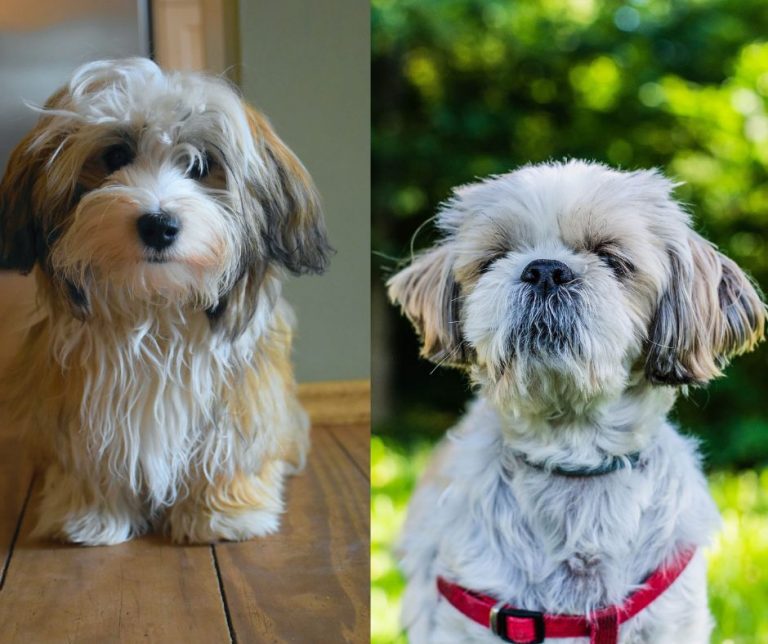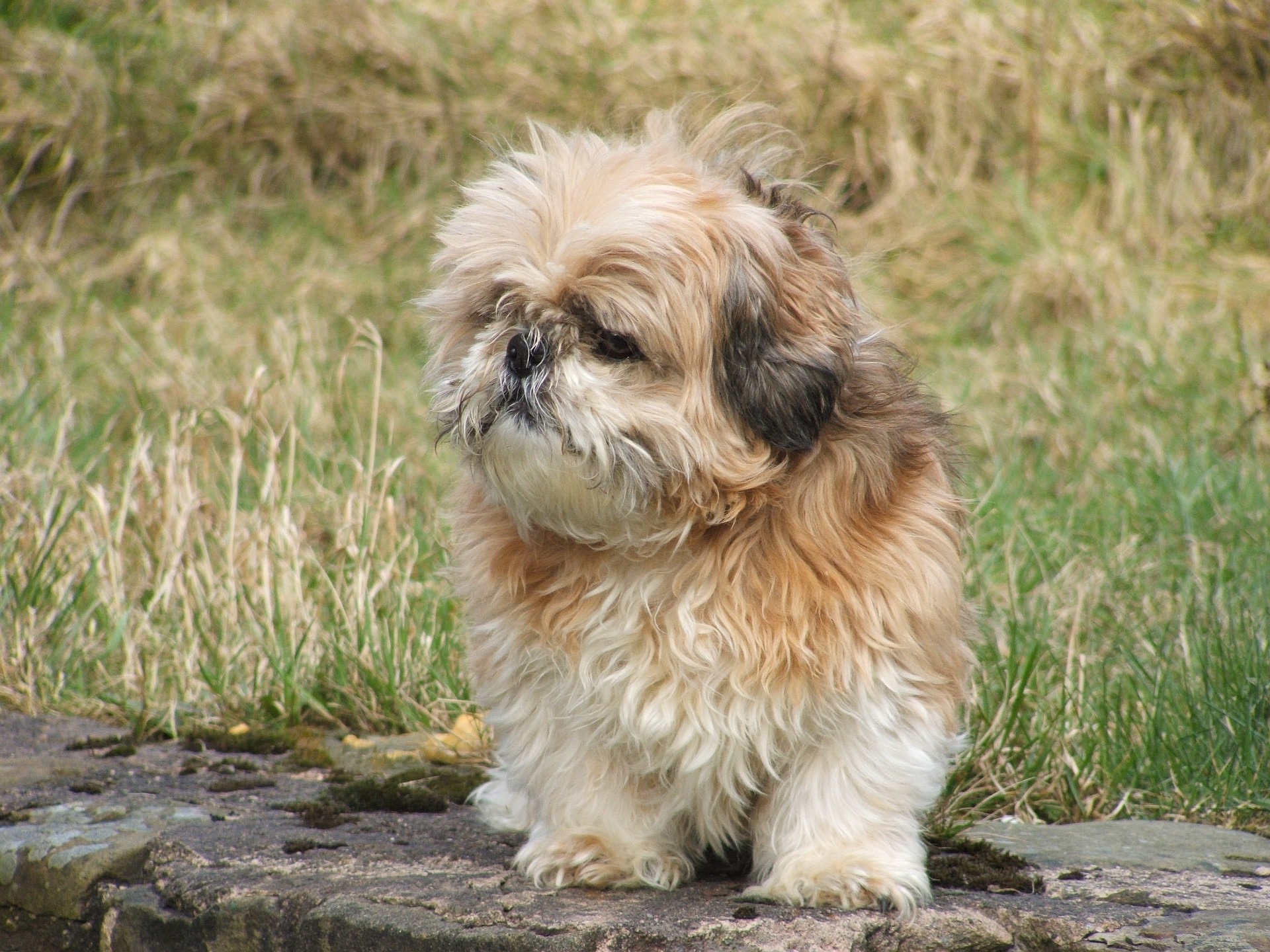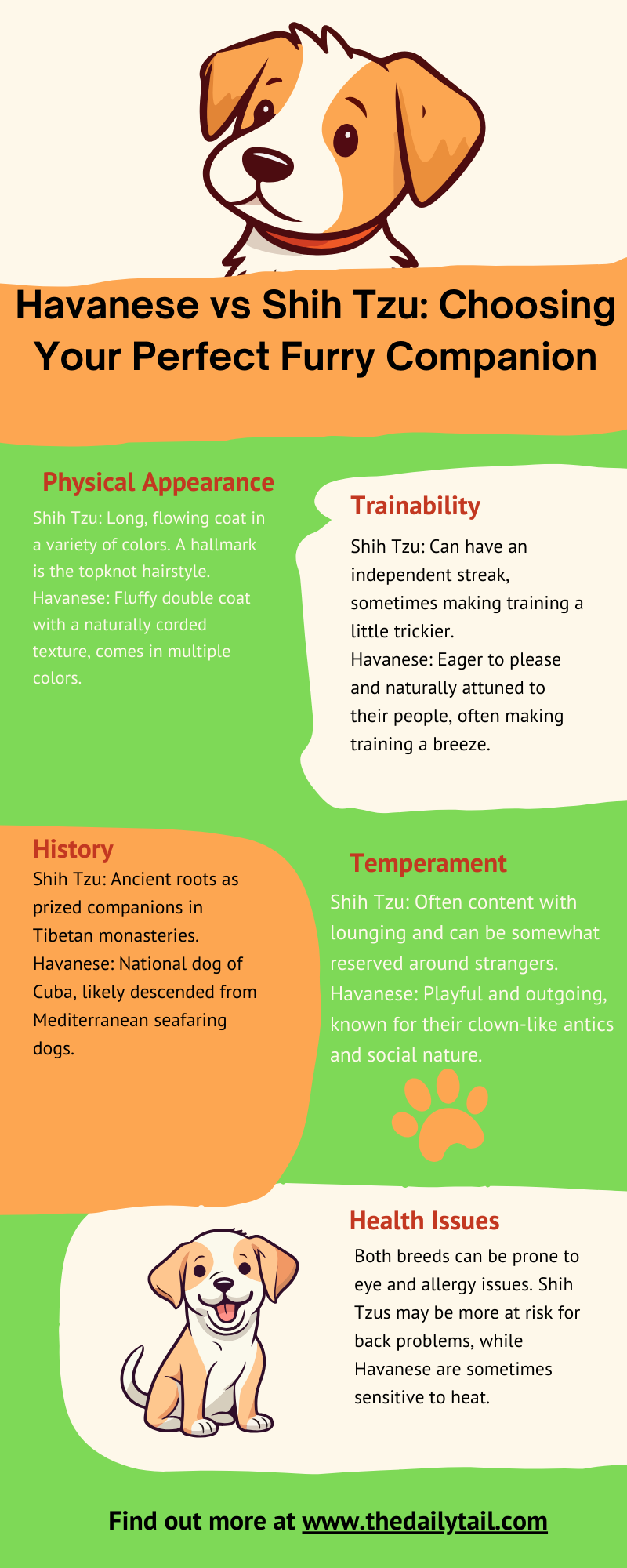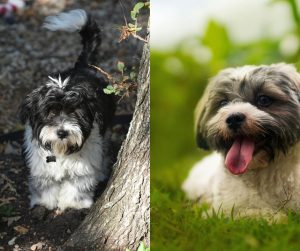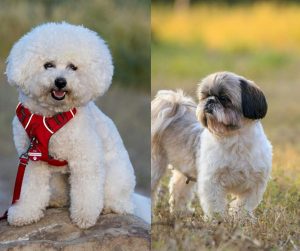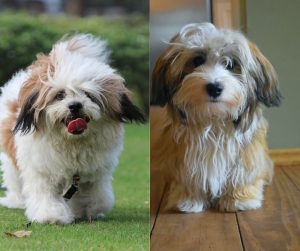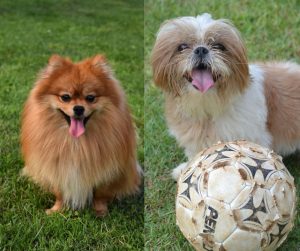If you’re searching for a cuddly ray of sunshine disguised as a dog, both the Shih Tzu and Havanese will likely steal your heart! As a long-time lover of small breeds, I know how easy it is to fall for their sweet faces. But did you know there are subtle distinctions that make each of them unique?
When comparing the Havanese and the Shih Tzu breeds, prospective pet owners often find themselves weighing the charms of these two adorable, small-breed dogs. Both capturing hearts with their distinctive looks and lovable personalities, these breeds have found their way into the homes and affections of families worldwide.
Understanding their backgrounds, the Havanese hailed from Cuba and quickly became a favorite for their sociable nature, while the Shih Tzu’s royal Chinese origins gave them a regal aura that’s hard to ignore.
Physically, these dogs are similar in size, but with distinctive features that tell their tales. The Havanese flaunts a silky, flowing coat, and expressive eyes, while the Shih Tzu’s proud bearing and luxuriant fur give it an unmistakable presence. They share a common ground in their love for companionship, expressing it through their spirited and affectionate demeanor.
They differ in grooming needs and exercise, with the Havanese usually requiring a bit more in terms of coat maintenance, and the Shih Tzu often content with shorter strolls.
Choosing between a Havanese vs Shih Tzu dog breed often boils down to personal preference, lifestyle, and the unique quirks each breed brings to the family dynamic. Both breeds are intelligent and trainable, but one must also consider their health and care requirements, ensuring they can provide a loving and appropriate home for their chosen companion.
Key Takeaways
- Havanese and Shih Tzu are both small, affectionate breeds ideal for families.
- They require different levels of grooming and exercise due to their distinctive coats.
- Choosing the right breed depends on an individual’s lifestyle and the dog’s needs.
Breed Origins
When delving into the rich tapestry of the Havanese and Shih Tzu breeds, their vibrant histories paint a picture of cultural significance and refined breeding. They both carry a legacy that is deeply entwined with the aristocracy and nobility of their native lands—Cuba and China, respectively. Now, let’s take a closer look at each breed’s fascinating backstory.
Havanese History
Originating from Cuba, the Havanese is affectionately known as the “national dog of Cuba.” This breed’s lineage can be traced back to the now-extinct Blanquito de la Habana, which is believed to be a crossbreed involving the Bichon Frise. The Havanese’s ancestors were companions to Cuban aristocracy and gained popularity in Europe due to their charm and intelligence.
However, the Cuban Revolution played a significant role in the breed’s history, as it led to the displacement of many Havanese dogs. These dogs found new homes in the United States, where they eventually garnered recognition by the American Kennel Club (AKC) and were officially added to the AKC stud book in 1996.
Shih Tzu Ancestry
The Shih Tzu’s roots are deeply planted in the ancient Chinese empire, where they were treasured as loyal companions to Chinese royalty. Their ancestry includes breeds such as the Pekingese and the Lhaso Apso, hailing from the realms of Tibet and China. Evidently a favored breed within the Chinese court, it is believed that the Shih Tzu was developed to resemble “little lions,” reflecting their name which translates to “lion dog.”
The Shih Tzu’s journey to the Western world was marked by their introduction to England in the mid-20th century and subsequent recognition by the American Kennel Club, making them a globally cherished companion.
Physical Characteristics
When comparing the Havanese breed to the Shih Tzu breed, it’s the details in their looks that really stand out. They both share that irresistible charm of small dogs, but their physical traits have subtle yet noticeable differences which are important for potential owners to recognize.
Size and Weight
Havanese
- Height: 8.5 – 11.5 inches
- Weight: 7 – 13 pounds
Shih Tzu
- Height: 8 – 11 inches
- Weight: 9 – 16 pounds
Both breeds are considered small, yet the Shih Tzu tends to be slightly heavier. Their compact sizes make them ideal companions for apartment living and their presence is as delightful as you’d expect from such personable little creatures.
Coat and Colors
Havanese
- Coat type: Long, silky, and can develop cording
- Coat colors: Comes in a spectrum, including but not limited to black, white, fawn, and chocolate
- Hypoallergenic: Yes
Shih Tzu
- Coat type: Has a double coat that is dense and can get quite long, sometimes leading to a matted appearance if not groomed regularly
- Coat colors: Also varied, with shades ranging from black to white, gold to silver, and combinations thereof
- Hypoallergenic: Yes, but requires more frequent grooming due to its thick coat
One can’t help but smile when seeing the Havanese breed’s silky fur gently move as they trot, just as the distinctive, luxurious coat of a well-groomed Shih Tzu can turn heads. Each of these breeds has its own particular set of grooming needs, with the Shih Tzu’s double coat requiring more attention to prevent matting, while the Havanese’s unique coat may form cords, a look that is as unique as it is adorable. Despite these differences, both breeds share the characteristic of being considered hypoallergenic, which is a relief for those with allergies.
Temperament and Personality
When choosing between a Havanese vs Shih Tzu dog breed, it’s important to consider how their unique temperaments will mesh with your home life. Both breeds are renowned for their affectionate nature and friendliness, making them wonderful companions.
Behavior Patterns
Havanese:
- Known for their easy-going temperament
- Often described as happy and outgoing
Shih Tzu:
- Renowned for being affectionate lap dogs
- Typically exhibit a loving and friendly disposition
Adaptability
Havanese:
- Highly adaptable to various living situations, including apartments
- Their energy level is moderate, suitable for both active and relaxed families
Shih Tzu:
- Also apartment-friendly, able to thrive in small spaces
- Can be a bit more independent, but still enjoys being part of family activities
Interaction with Children and Other Pets
Havanese:
- Family-friendly and great with children, often patient and gentle
- Typically other pet-friendly and can get along well with pets, including cats
Shih Tzu:
- Affectionate with children, making them a solid choice for a family pet
- Their outgoing nature means they’re usually cat-friendly and good with other animals
Health and Care
When choosing between a Havanese and a Shih Tzu, understanding their health and grooming needs is key. They share some common concerns, but each breed has its unique care requirements.
Common Health Issues
Both breeds have a lifespan typically ranging from 10 to 16 years for Shih Tzus and up to 14 years for Havanese. It’s crucial to be aware of certain breed-specific conditions they may face:
- Havanese:
- Cataracts
- Hip Dysplasia
- Patellar Luxation
- Heart Murmurs
- Chondrodysplasia
- Deafness
- Shih Tzu:
- Allergies
- Kidney Problems
- Hip Dysplasia
- Dry Eye
- Progressive Retinal Atrophy
- Patellar Luxation
Routine checks with the vet can help catch these issues early on.
Grooming Needs
Grooming is not just a duty; it’s a way to bond with these furry friends. They have different needs, so here’s what a pet parent can expect:
- Havanese: These little ones have a long, soft, and lightweight coat that requires daily brushing to prevent tangles. They also have a double coat that can get matted without proper care
- Shih Tzu: The luxurious coat of a Shih Tzu also requires daily commitment. Brushing is crucial to prevent mats and keeping their coat healthy and shiny, which reflects their overall health
In both breeds, regular ear cleaning is a must, and nail trimming should be a part of their grooming routine. Exercise is another form of care, and both breeds benefit from daily walks and play, helping prevent obesity that could exacerbate health issues like hip dysplasia.
Training and Exercise
When it comes to the Shih Tzu and Havanese breeds, their trainability and exercise requirements are distinctive yet manageable. They both share an affectionate nature, which can make training a pleasant experience, though their needs differ slightly in intensity and approach.
Trainability and Intelligence
The Shih Tzu is known for being happy-go-lucky and affectionate, with an outgoing personality. They are quite intelligent, but training them typically requires a bit of patience as they can be somewhat stubborn. Using positive reinforcement and consistent training sessions will encourage a Shih Tzu to learn and follow commands.
In contrast, Havanese dogs are often highly trainable and eager to please. Their intelligence shines through in training sessions, especially when they’re made fun and rewarding. Their trainability makes them suitable for various dog sports and activities. A gentle, yet firm approach works best with them.
Exercise Needs
As for exercise, let’s break it down:
- Shih Tzu: They have a moderate energy level which means they need regular exercise, but not too much
Activity Type Required Time Notes Walks 30 mins Twice a day preferred Playtime 30 mins Tug-of-war, fetch, etc. - Havanese: These little adventurers have slightly higher energy levels than Shih Tzus and enjoy being active. They also do well with about an hour of exercise per day, enjoying both leashed walks and free play in a secure area
Activity Type Required Time Notes Walks 30-40 mins Can be split into two sessions Playtime 20-30 mins Includes training exercises
Both breeds have the potential to be good watchdogs, alert and aware of their surroundings during outdoor activities. They don’t need vigorous exercise but benefit greatly from daily walks and playtime that keep their minds and bodies active.
Living with a Havanese or Shih Tzu
Choosing between a Havanese and a Shih Tzu is more than just selecting a breed; it’s about welcoming a new member into your home. Both these companions are known for their friendly and affectionate natures, but they each have their own care needs and behavioral traits. As a companion dog, any of these breeds will do just fine.
Day-to-Day Care
Havanese and Shih Tzu dogs require daily care that revolves around their physical and emotional wellbeing.
- They have luxurious coats that need regular grooming to prevent matting. Daily brushing is recommended, and professional grooming every 4 to 6 weeks can help maintain their coats’ health and appearance
- Feeding: These breeds do well on high-quality dog food, with the amount based on their size, age, and activity levels. Typically, a Havanese might need up to 1 cup of food a day, while a Shih Tzu often requires about the same
- Exercise: Both breeds need moderate daily exercise. A short walk and playtime are usually sufficient to keep them healthy and stave off boredom
Behavioral Considerations
The Havanese and Shih Tzu are affectionate and love to be lap dogs, making them excellent companions who often forge a strong bond with their owners. While both are friendly, they might show separation anxiety if left alone for too long.
- Barking: Havanese tend to be moderate barkers and can be trained to minimize noise. Shih Tzus are comparatively quieter but will bark to alert their owners, showcasing their watchful nature
- Aggression: Usually, neither breed shows significant aggression, with proper socialization
- Independence: Shih Tzus can exhibit more independence than Havanese, who are more likely to seek constant companionship
Suitability for Owners
These dog breeds fit well into family settings and are typically ideal for seniors and first-time pet owners due to their manageable size and loyal temperament.
- Protection: While they offer little in the way of traditional protection due to their size, they can be good alert dogs
- Affection: They thrive on affection and are known to be quite friendly with children and other pets, often becoming a loved part of the family unit quickly
Choosing Between Havanese and Shih Tzu
When contemplating a new furry companion, prospective pet owners weigh several factors: temperament, energy level, and grooming needs. It’s important to consider how a breed fits into family life.
Making the Decision
For those considering a Havanese or Shih Tzu puppy, they’ll find both breeds share affable temperaments, making them excellent family pets. These breeds thrive on companionship and affection. However, the Havanese, being an energetic playmate, may suit families with a more active lifestyle, ready for regular walks and playtime. The Shih Tzu, while still playful, often has a more laid-back energy.
Temperament:
- Havanese: Social, highly trainable, enjoys activities
- Shih Tzu: Affectionate, cheerful, slightly less active
Grooming Needs:
- Havanese: Moderate; regular brushing and occasional trims
- Shih Tzu: High; daily brushing, frequent professional grooming
Family Suitability:
- Both breeds: Family-friendly and generally good with children
Summary and Final Thoughts
When choosing between a Havanese and a Shih Tzu puppy, prospective pet parents will find kindred spirits in both, with their rich histories and loving temperaments. Let’s break down what makes each breed unique.
History:
- Havanese: Originated from Cuba and were companions to the Cuban aristocracy
- Shih Tzu: A breed steeped in royalty, these “little lion dogs” have roots in ancient Tibet
Temperament: Both breeds pack a lot of personality into petite frames and are known for their affection towards their families, making them excellent companions.
Health: These breeds are generally healthy, but routine check-ups are paramount to catch breed-specific issues early on:
- Havanese: Prone to hip dysplasia and hearing problems
- Shih Tzu: Watch for eye and breathing issues due to their facial structure
Care: Their luxurious coats need regular grooming to prevent tangles. Daily brushing is your new zen moment.
Family-Friendly: Both breeds adore children and make wonderful family pets. They’re fantastic little buddies for playdates and cuddles.
In terms of training, both are quite agreeable but will require patience and consistency. Think of it as building a friendship.
Walks are enjoyable for them, yet they don’t demand excessive exercise, making them suitable even for apartment living.
Whether a Havanese or Shih Tzu joins your family, they’ll fill your home with joy, entertainment, and unabashed love.

